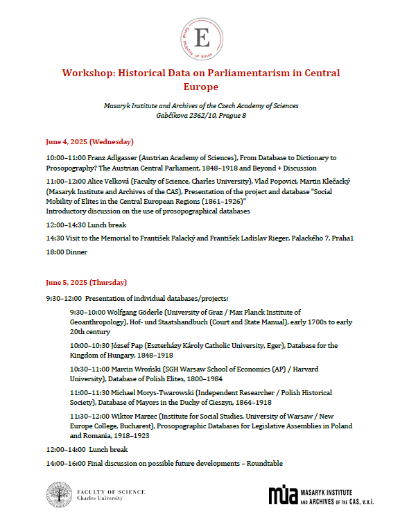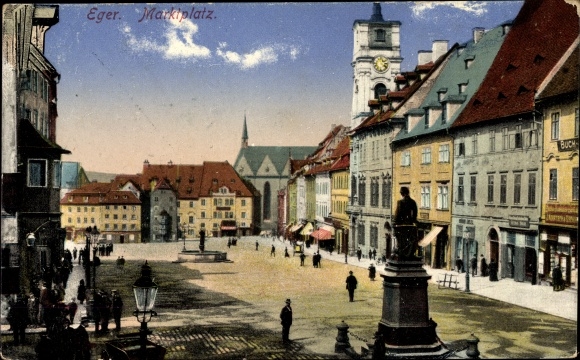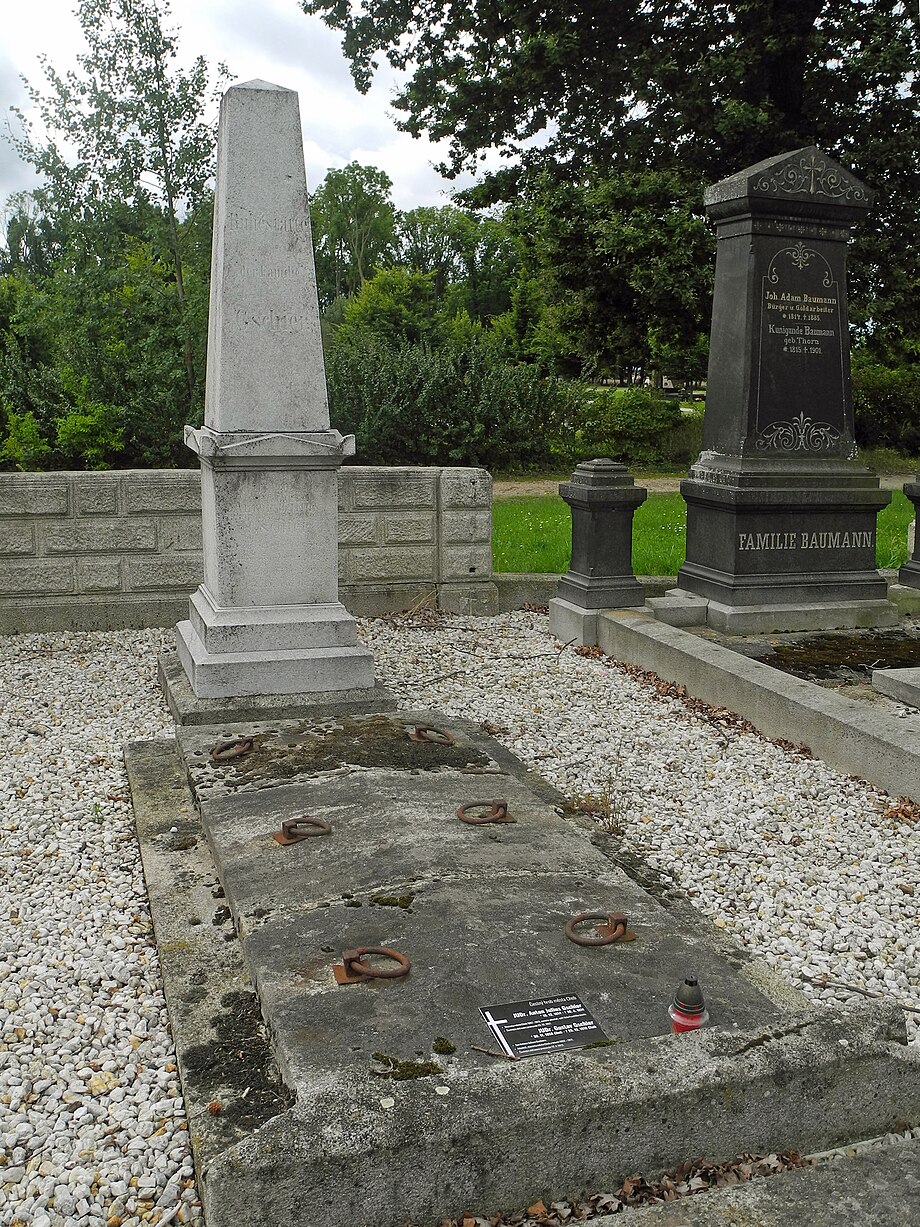
Elite of month – Gschier, Anton Julius (1814–1874), lawyer, deputy and mayor
Anton Julius Gschier (1814–1874), lawyer, deputy and mayor
The possibility to penetrate among the political elite of the Habsburg Monarchy in the latter half of the 19th century was significantly influenced by the institutional structure of the Empire and the way in which representatives at various levels of self-government were selected. From the middle of the century, when the first elections to the Imperial Council took place in 1848, and in the following decades, until the electoral reform in 1907 introduced universal suffrage for men, the electoral districts for both the provincial and imperial parliament were usually territorially rather small, always covering only a few neighbouring towns or districts. Especially in the provincial diets electoral districts of the municipal curia in Bohemia often included one town or two towns.

Postcard from Cheb from the nineteenth century.
Within Bohemia, the region of Cheb/Eger, with its natural centre in the town of Cheb, was rather specific. The revival of public life in the spring of 1848 brought with it calls for the restoration of an independent status of the region or even the return of the territory to the Empire. This was also the reason why Cheb citizens refused to elect their representatives to the reformed Bohemian Diet on the grounds that they did not recognise this assembly as their representative body. It is in this context that Anton Julius Gschier, a Cheb native and lawyer, who in the 1840s worked as a Justiziar (official endowed with judicial powers) on the surrounding estates, soon established himself as one of the main spokesmen of the exclusively German speaking Cheb bourgeoisie.
Gschier was born into the family of a Cheb municipal official whose wife was the daughter of one of the first Cheb mayors of the so-called regulated municipal office. Jeremias Gschier (1783–1841) and his wife had only one son, the aforementioned Anton Julius, born on 19 December 1814, more than five years after their wedding. No other children could be traced, nor do they appear on Jeremias’ death notice of 1841. Even so, the clerk’s family was unable to fully provide for their only son’s studies, so Anton was supported by a scholarship intended for the children of Cheb’s burghers.
One year after his father’s death, the young Gschier married the daughter of a local post supervisor and later administrator of the state postal service. No other significant family or kinship ties could be found in the sources available. The key moments shaping his career were the events linked to the abolition of patrimonial administration and the revival of public life in 1848–1849. As a doctor of law and representative of the educated bourgeoisie, Gschier was one of the chief organisers of the burghers’ assemblies that prepared petitions addressed to the Emperor and the government. However, his views apparently clashed with those of the majority of Cheb bourgeoisie representatives. While these venerable patres looked more towards the past and aimed to restore the special status of the town and its surroundings within the Habsburg Empire, Gschier was a progressive and liberally oriented representative of the new intellectual elites. Among other things, he advocated, albeit unsuccessfully, the sending of Cheb representatives to the provincial assembly in Prague. Later, he even recognised the usefulness of optional Czech language instruction at the local grammar school. His views as well as his apparently very uncompromising and vigorous discourse were the reason why he was not as widely recognized and accepted as other local personalities such as the local pharmacist Adolf Tachezi (1814–1892) or the burgher Franz Ernst.
It was the preparation of a petition containing the demands of the town that caused a split in the burghers’ committee elected in March 1848, with Gschier as president. Gschier had vigorously opposed the idea of Cheb’s own Diet or a new convocation of the Cheb Estates, and resigned from the committee in April. Despite his liberal views, still in 1851 Gschier obtained the post of barrister in Cheb, securing thus a permanent presence in the town. By then, Cheb had become a major administrative centre and the seat of new state offices: the district captainship, the regional government, the regional and district court, the grammar school and the chamber of commerce and trade. It was the latter institution that later chose Gschier as its secretary. This post guaranteed him a regular salary, in addition to the income from his legal practice. It also provided him with a range of contacts with like-minded liberal representatives of local industry and commerce.
At the turn of 1851 and 1852, the neighbouring town of Františkovy Lázně was definitively excluded out of the cadastre of the Cheb municipality. As a result, new elections of the municipal self-governing body in line with Stadion’s provisional municipal law could take place. Although Gschier became a member of the municipal committee, his election was not unanimous, and definitely not as unambiguous as that of some other candidates. He received 90 of the 179 votes cast and in the end was not even selected into the more restricted body of councillors, which included a local brewer, a chemist, a doctor and two merchants.
In 1855, Gschier became a town councillor after some members of the committee resigned. Unfortunately, we do not know the exact reasons which brought Gschier back as a leading representative of the Cheb bourgeoisie. It could have been his involvement in the chamber of commerce, his work in the town, where he was one of only three barristers, or his renewed willingness and readiness to participate in the running of public affairs. He immediately began to push his ideas on how the town should function. Among other things, he put through the construction of walking paths and gazebos around the town. He also supported the reconstruction of the St. James Brotherhood Home, a traditional Cheb institution where the poor and old townspeople could live their last years in dignity.
At the beginning of the 1860s, conditions in Austria began to change. The financial crisis, compounded by the disastrous debacle of the Austrian army in northern Italy, forced the Emperor to accept constitutional reform. The renewed elections to the municipal committees confirmed Gschier’s position as one of the councillors and also – and more importantly – as the city’s representative in the newly constituted Bohemian Diet. Before election, Gschier presented himself publicly as a liberal candidate. He declared his support for industry and commerce, vocational education, and the status of municipalities as basic units of self-government. He had to tread carefully, however. Indeed, certain passages of his statement, published by the local newspaper, in which he calls for dampening of passions and setting aside personal interests, show that he was not universally accepted in the town.
As a liberal, he had a rather complicated position in Cheb. Unlike his colleagues and fellow liberal deputies, who strongly opposed the historical Bohemian state law and upheld the centralisation of the Empire, he realized the importance of the historical status of the town for his fellow citizens. Rejecting traditional rights and denying the specific status of the region would certainly not win him many votes. This is why he preferred not to mention this topic at all in his statement. In the end, also thanks to the absence of major opponents, he received 341 votes out of 349 ballots cast. The Bohemian Diet selected him as a member of the Imperial Council and Gschier became one of the representatives in the parliament in Vienna. Thus, in the mid-1860s, Julius Gschier’s political career reached its peak. He was both a provincial and imperial deputy, a city councillor and a member of the district council. At the same time, however, he was already fifty years old and apparently began to experience health problems. These forced him to give up his career as a deputy and return to the settled life of a Cheb burgher. For the candidates from outside Prague and Vienna, work in Parliament entailed frequent travel, staying in hotels, long periods without family or eating outside one’s home, which was not only uncomfortable and expensive, but also caused health complications for many deputies.
Despite that, Gschier did not completely retreat into seclusion. In September 1867, after the previous mayor Franz Ernst refused to continue in his office due to his old age, it was Gschier who was elected mayor by 31 votes out of 35. In his inaugural speech he said that he was at an age where he no longer desired public offices and positions. He also mentioned his health issues. He declared that he accepted the office of mayor only because of his unwavering belief in public life and its importance (Glaube an ein öffentliches Leben). Gschier remained in the office of mayor for two terms. Already in the first few months he proved to be a skilled organiser and a man with a clear vision. He reorganised the municipal office, reforming the functioning of the municipal committee and its specialised commissions. He also introduced new office regulations, revised the market regulations and increased the number of municipal policemen, raising their wages. He also had his own remuneration increased to 1,000 Guldens. At the end of his second term, however, he was progressively left with less and less energy. By 1873 he was virtually absent from the municipal committee meetings where he had to be replaced by the councillor Adolf Tachezy, who also became mayor at the next municipal elections. Anton Julius Gschier died shortly afterwards, on 30 June 1874.

Grave of the Gschier family in Cheb (Wikimedia Commons, author: SchiDD)
Gschier can serve as an example of an individual whose social advance was made possible by his abilities, education, ambition and suitable opportunities. As one of the few legally educated members of the bourgeoisie of the time, he managed to assert himself relatively quickly in the new "constitutional" setting of 1848. Although his belief that it was important to be publicly active and to influence public affairs brought him, on more than one occasion, into conflict with the traditional Cheb bourgeoisie, what ultimately prevailed were his rhetorical skills, his vision of the necessary reforms and the willingness to devote his time and resources to public issues. It is clear that in his public activities Gschier had to rely on the contacts and relationships he had built by himself in the course of his life, but which he could also pass on to his children.
Bibliography
Charmatz, Richard. Österreichs innere Geschichte von 1848 bis 1907: II. Der Kampf der Nationen. Leipzig: B. G. Teubner, 1912.
Judson, Pieter M. The Habsburg Empire: A New History. Cambridge, MA, and London: Harvard University Press, 2016.
Sterneck, Tomáš. “Komplot pomstychtivého pleticháře? Ke kontroverzím vzniku českobudějovického regulovaného magistrátu v roce 1787 [A plot by a vengeful schemer? On the controversies of the establishment of the regulated municipality of České Budějovice in 1787].” Jihočeský sborník historický 89, no. 1 (2020): 73–120.
Šťouračová, Jiřina. “Reformní zásahy Marie Terezie a Josefa II. do městské správy na Moravě [Reform interventions of Maria Theresa and Joseph II in the municipal administration in Moravia].” Sborník prací Filozofické fakulty brněnské univerzity 50, no. 1 (2003): 169–76.
Velek, Luboš. “’Takový život nestojí za zlámanou grešli!’ Obrázky ze života českých poslanců 19. století [‘Such a life is not worth a broken penny!’ Pictures from the life of Czech parliamentary deputies in the 19th century].” Kuděj. Časopis pro kulturní dějiny 1, no. 2 (1999): 49–63.


